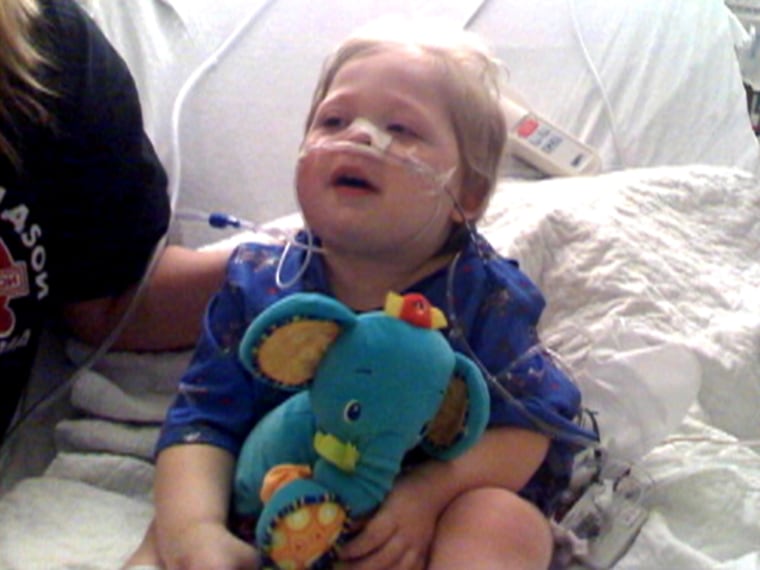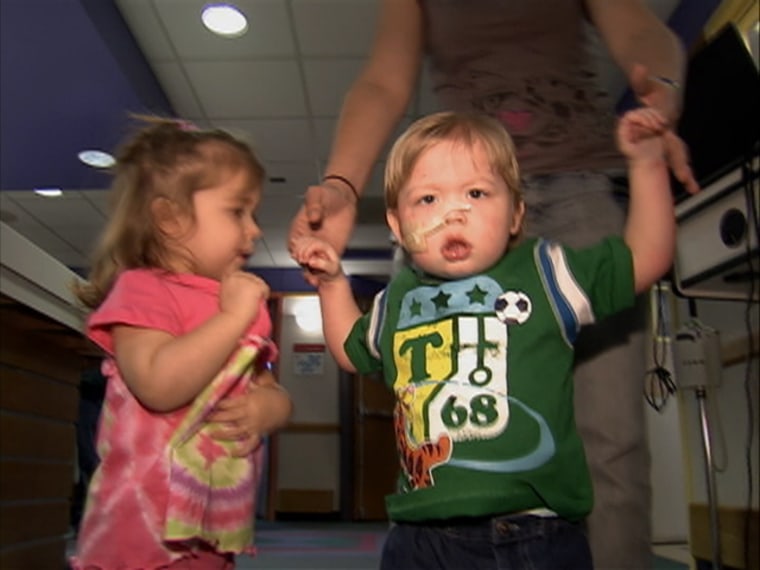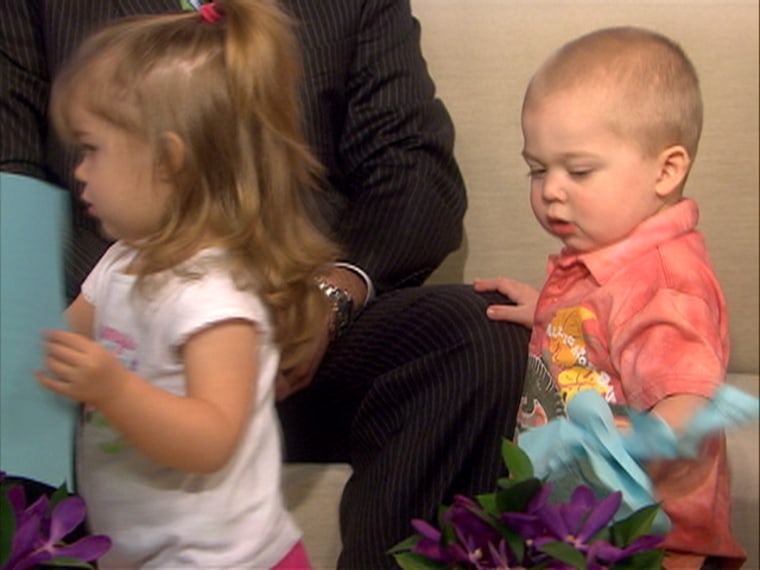The little boy was doing what 2-year-olds do, which is to say he couldn’t sit still — couldn’t sit at all, really — and anything left lying around was going to end up on the floor.
What made this totally normal behavior remarkable is that just six weeks ago, the same boy was pulled from a wrecked car after spending nearly 20 minutes submerged in an Ohio creek.
“He’s almost back to himself,” Troy Adams’ mother, Laura Adams, told TODAY’s Matt Lauer Tuesday in New York. As she said that, Troy was busy scattering scripts on the floor and inspecting everything in sight.
Adams said that Troy still has some recovery ahead of him, but doctors think that he’ll quickly regain all of his functions as he chases his twin sister, Lexi, around, trying to keep up with her.
Rude awakeningLaura Adams told Lauer about the day when she was sure she had lost Troy.
It was Feb. 24, and she had picked up Lexi and Troy from day care after her shift at work. Driving home on a rural road, she briefly fell asleep at the wheel of her compact car. When she woke up, the car was drifting off the road. She tried to correct but instead crashed through a guardrail and ended up upside-down in 3 feet of frigid water in a creek.
“I was completely underwater, drowning. I was thinking, ‘I’m gonna die,’ ” Adams told Lauer.
She had not been wearing a seat belt and was able to swim out the window. She tried to get her twins out of their booster seats in the back, but was unable to.
Frantic, Adams waved down a passing motorist, who joined her in the creek. Together, she and the man who stopped to help were able to free Lexi, but they couldn’t get Troy out of the crushed vehicle.
Lexi’s condition wasn’t promising at first, either. Adams estimates that her daughter had been underwater as long as 5 minutes.
“At first, she wasn’t responding. About the time the paramedics showed up, she started puking and breathing on her own,” Adams said.
‘Troy’s dead’But Troy was another matter. As rescuers worked frantically to cut the car open and get the boy out, he wasn’t breathing and the clock was ticking. By the time he was freed, he had been submerged in the frigid water for an estimated 15 to 17 minutes. His body was cold and he showed no signs of life.

“When I called my family, all I could say was, ‘Troy’s dead,’ ” Adams told Lauer. “They had just gotten him out of the water at that time. I had no idea he would make it.”
She wasn’t the only one with that thought. Sitting next to her in Studio 1A was Dr. Michael Bigham, who had supervised Troy’s care at Akron Children’s Hospital.
“He was lifeless. He was not responding to pain,” Bigham said of Troy’s condition when he arrived. After not breathing at all for at least a quarter of an hour, the toddler was being ventilated with the aid of a tracheotomy — a tube in his throat. He was also suffering from hypothermia.
Knowing that other children have survived relatively unscathed after lengthy submersion in very cold water, Bigham and his team of doctors did not immediately warm Troy up, choosing to keep his body cool for the first 24 hours in the hospital.

Just the same, Bigham was not encouraging to Adams.
“When children go without oxygen for a long period of time, their brains can sometimes be permanently damaged. That’s the conversation I had with Laura that evening, that I was concerned that Troy’s brain would be irreversibly damaged,” Bigham said.
“They said he was not going to make it through the night,” is how Adams remembered the conversation.
‘A lucky kid’But Troy did make it through that night, and the next one, and the one after that. As he continued to improve, Bigham adjusted his expectations of how much function the boy would regain.
Children’s brains are plastic and can rewire themselves and recover function much more easily than adult brains. Bigham believes that keeping Troy’s body temperature below normal at first also helped.

“There’s some protection provided by the cold water,” Bigham said. “That is surely what saved Troy’s life and allowed him to be so high-functioning at this point.”
MRIs show that Troy’s brain is normal, although he still has some difficulty swallowing and was on a feeding tube during more than a month in the hospital and its rehab center.
“As long as he continues to progress at the rate he’s been progressing, there is no reason to expect he won’t fully recover. He’s showed no plateauing at all,” Bigham said. “He’s a lucky kid.”
He’s also a busy kid. His forearm decorated with a temporary tattoo, Troy continued his inspection tour of the studio as his mom and Bigham talked with Lauer. He even ignored his sister when she took a tumble and needed huggy time with Mom.
There were manila folders to open, papers to scatter on the floor, things to see and do. Full of life — not to mention spit and vinegar — he wasn’t going to miss any of it.